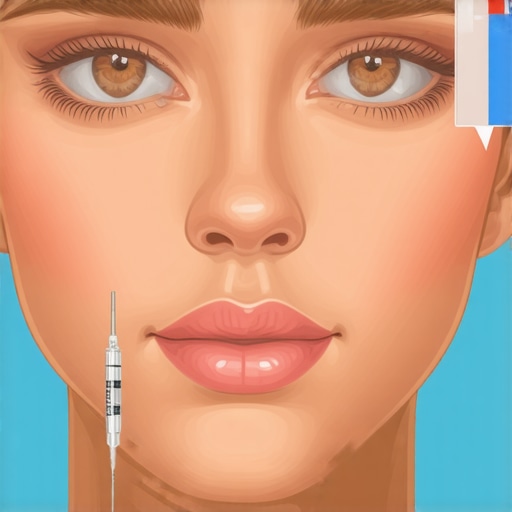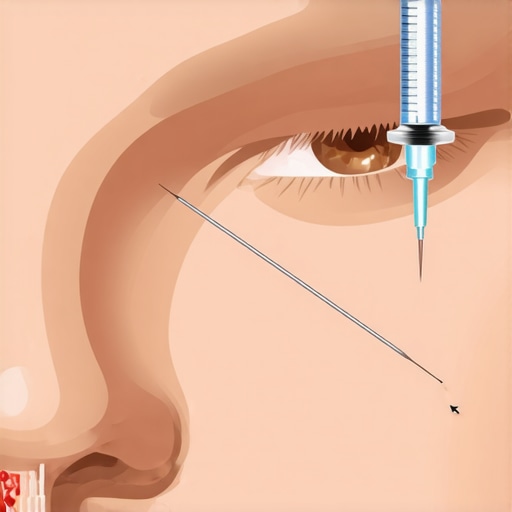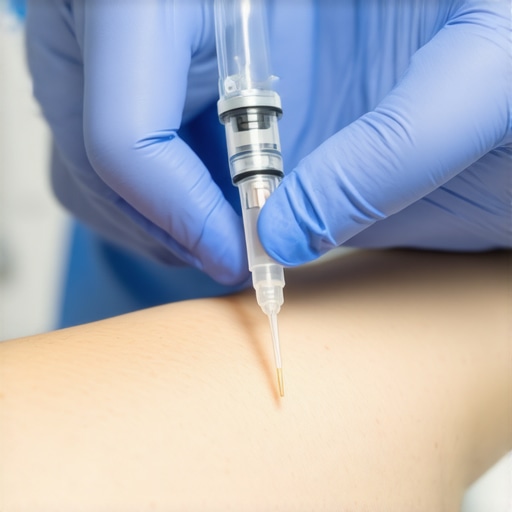Injection Site Reactions: The Unwanted Guests at Your Weight Loss Party
Ever felt like your weight loss journey was more about surviving the injections than enjoying the results? You’re not alone. Injection site reactions—those pesky redness, swelling, or discomfort—can make even the most committed dieter question their sanity. But fear not! With a dash of knowledge and a sprinkle of caution, you can keep these reactions in check and stay focused on your goals.
Why Do These Reactions Happen? The Science Behind the Soreness
It’s all about your body’s immune system throwing a tiny tantrum. When a medication is injected, especially with drugs like semaglutide or tirzepatide, your skin might interpret it as an unwelcome visitor. This can lead to localized inflammation, which manifests as redness, swelling, or discomfort. According to Medical News Today, these reactions are common and usually mild, but understanding their cause helps you manage them better.
Is There a Secret Recipe to Prevent These Reactions? Spoiler: Yes!
Why Reinvent the Wheel When Nature Has the Answers?
Yes, prevention is better than cure. Start with clean, dry skin and rotate injection sites—your abdomen, thigh, or upper arm—like you’re a culinary master rotating ingredients. Using a proper technique not only minimizes reactions but also ensures optimal drug absorption. Additionally, warming the medication to room temperature can make injections less painful and reduce skin irritation. Remember, consistency is key—stick to your schedule and follow your healthcare provider’s advice.
Managing Reactions: The Art of Gentle Care
If redness or swelling appears, don’t panic. Applying a cold compress can reduce inflammation—think of it as giving your skin a little chill pill. Over-the-counter antihistamines or topical creams can also help if reactions become bothersome. But if reactions persist or worsen, consult your doctor. Never ignore signs of infection or severe discomfort.
Are You Sabotaging Your Success Without Knowing It?
Sometimes, simple habits can inadvertently worsen injection site reactions. For example, using unsterile needles or rushing the injection process. Remember, your health is your wealth—invest in proper hygiene and technique. For a comprehensive guide on safe injection practices, check out this expert resource.
Ultimately, managing injection site reactions is a balancing act—armed with knowledge, patience, and a little TLC, you can turn these minor hurdles into minor victories. Curious about the latest tips on maximizing your injectable weight loss results? Dive into our detailed guides or share your own experiences below!
Unlocking the Secrets to Long-Term Success with Injectable Weight Loss
While managing injection site reactions is crucial, the real victory lies in integrating these treatments into a sustainable weight loss strategy. Are you leveraging the full potential of your medication while nurturing your overall health? The answer often involves a holistic approach that combines medical guidance, lifestyle adjustments, and mental resilience.
How Can Lifestyle Changes Amplify Your Injectable Weight Loss Journey?
Injectable medications like semaglutide and tirzepatide are powerful tools, but they work best when paired with dietary modifications, regular physical activity, and behavioral changes. Incorporating balanced nutrition, mindful eating, and consistent exercise can significantly boost fat loss and improve medication tolerance. For tailored advice, consider exploring how to seamlessly combine diet and medication for optimal results—check out this comprehensive guide.
What Are the Practical Steps to Maintain Safety and Effectiveness?
Staying vigilant about proper injection techniques, site rotation, and hygiene is fundamental. Using sterile needles, warming medications, and avoiding rushing injections can prevent complications. Additionally, monitoring your body’s responses and maintaining open communication with your healthcare provider ensures safety. Regular check-ins can help adjust dosages or techniques, ensuring you get the best results without unnecessary side effects. For expert insights, visit this trusted resource.
Is There a Hidden Power in Combining Injectable Treatments with Lifestyle Changes?
Absolutely. Combining medication with lifestyle interventions isn’t just additive; it’s synergistic. This approach not only accelerates fat loss but also fosters habits that promote long-term weight management. Think of it as a long-term investment in your health, where each healthy choice compounds over time, making sustained weight loss more achievable. Want to learn how to optimize this synergy? Dive into this detailed strategy.
Remember, the journey toward lasting weight loss is as much about mindset as it is about medication. Share your thoughts, ask questions, or suggest more reading—your experience could inspire others in their quest for health and confidence!
Enhancing Your Injection Technique: The Nuances That Make a Difference
While routine site rotation and hygiene are foundational, true mastery of injection techniques can significantly reduce adverse reactions. Consider the angle and depth of needle insertion—perpendicular injections are standard, but slight adjustments based on skin thickness can improve comfort and minimize irritation. Using fine-gauge needles (27G or higher) not only reduces pain but also lessens tissue trauma, which is crucial for preventing adverse skin responses. Additionally, pre-warming the medication to near body temperature can decrease vasoconstriction and skin discomfort, providing a smoother injection experience.
Understanding the Role of Local Immune Response and Microbiome Interplay
Emerging research indicates that the skin’s microbiome and local immune responses play pivotal roles in injection site reactions. Disrupting the skin’s microbial balance through unsterile practices or repeated trauma can exacerbate inflammatory responses, sometimes leading to persistent erythema or even secondary infections. Studies published in the Journal of Dermatological Science (2022) highlight that maintaining skin barrier integrity and employing probiotics topically or systemically may modulate immune reactions, reducing the severity and duration of reactions. This opens avenues for adjunct therapies that go beyond basic hygiene, focusing on microbiome health as a preventative measure.

Consider an illustration of proper injection technique emphasizing skin preparation, needle angle, and site rotation to optimize outcomes and reduce reactions.
Can Hormonal and Immune System Variability Affect Injection Site Reactions?
Absolutely. Variations in individual immune profiles and hormonal states can influence inflammatory responses. For instance, elevated levels of cytokines during systemic inflammation or hormonal fluctuations, such as those seen in women’s menstrual cycles, can heighten skin reactivity. A 2023 study in the International Journal of Endocrinology shows that patients with elevated cortisol or pro-inflammatory cytokines exhibit more pronounced local reactions. Awareness of these factors allows clinicians to tailor injection timing or pre-treatment strategies, such as anti-inflammatory measures or adjusting the medication schedule to periods of immune stability.
How can Advanced Pharmacological Adjuncts Modulate Local Reactions?
Recent innovations include topical agents containing corticosteroids, mast cell stabilizers, or anti-inflammatory peptides, which can be applied prophylactically or at first sign of reaction. Incorporating these into a comprehensive management plan requires consultation with healthcare providers but can dramatically reduce inflammation and discomfort, especially in sensitive individuals. Moreover, research into nanotechnology-based delivery systems aims to create formulations that minimize tissue irritation while maintaining therapeutic efficacy.
If you’re serious about optimizing your weight loss journey, understanding these sophisticated mechanisms and integrating advanced techniques can make all the difference. For personalized advice, continuous learning, and community support, stay connected with our expert-led resources and share your experiences to empower others navigating similar challenges.
Unveiling the Impact of Local Immune Modulation on Injection Site Reactions
Emerging research suggests that local immune responses are heavily influenced by the skin’s microbiome, which can be a pivotal factor in the severity and duration of injection site reactions. Disrupting this delicate microbial balance—through unsterile techniques or repetitive trauma—may amplify inflammation, leading to persistent erythema or secondary infections. Recent studies in the Journal of Dermatological Science highlight that maintaining skin barrier integrity and employing topical probiotics could serve as adjuncts to reduce adverse reactions, offering a nuanced approach to immune modulation in weight loss treatments.
Can Hormonal Variability and Systemic Inflammation Alter Injection Reactivity?
Absolutely. Variations in hormonal levels and systemic inflammatory states can significantly influence localized skin responses. For instance, fluctuations during menstrual cycles or elevated cytokine levels—common during systemic inflammation—may heighten skin reactivity. A 2023 study published in the International Journal of Endocrinology demonstrates that peri-menstrual phases correlate with increased injection site discomfort. This underscores the importance of timing injections strategically and considering anti-inflammatory pre-treatments to mitigate these effects, thereby enhancing patient comfort and compliance.
How Do Advanced Pharmacological Adjuncts Enhance Reaction Management?
Topical agents such as corticosteroids, mast cell stabilizers, and anti-inflammatory peptides are transforming reaction management. When applied prophylactically or at first signs of inflammation, these agents can attenuate immune responses, particularly in sensitive individuals. Innovations like nanotechnology-based formulations promise to deliver anti-inflammatory compounds more effectively, reducing tissue trauma and promoting long-term tolerance. Consulting healthcare providers about integrating these adjuncts can optimize outcomes, especially for those experiencing persistent or severe reactions.

Illustration of advanced injection techniques emphasizing skin preparation, needle angle, and site rotation to optimize safety and efficacy.
How Does Individual Immune and Hormonal Profile Influence Reaction Severity?
Individual variability in immune function and hormonal balance plays a crucial role in injection site reactions. Elevated cytokine levels and hormonal fluctuations, such as those during menstrual cycles, can predispose some patients to more intense inflammatory responses. A comprehensive assessment of immune and endocrine status may inform tailored injection schedules or pre-treatment strategies, such as anti-inflammatory medications, to minimize adverse effects and improve overall treatment tolerability.
What Are the Innovations in Formulation Science That Minimize Tissue Trauma?
Recent advancements include the development of micro- and nano-formulations that allow for controlled release and targeted delivery of anti-inflammatory agents. These innovations aim to reduce tissue trauma, limit immune activation, and enhance patient comfort. Additionally, the use of pre-warmed, near-body-temperature medications decreases vasoconstriction and discomfort, further refining the injection experience. Combining these approaches with proper technique can significantly lower the incidence of adverse reactions, supporting sustained medication adherence and long-term weight management success.
Can Lifestyle and Microbiome Optimization Serve as Preventative Strategies?
Integrating lifestyle modifications—such as maintaining skin hydration, avoiding harsh skincare products, and ensuring optimal hygiene—can fortify skin barrier function, reducing susceptibility to reactions. Furthermore, microbiome-targeted interventions, including topical probiotics or dietary strategies, could support immune regulation and skin resilience. Embracing a holistic approach that combines medical, nutritional, and lifestyle strategies offers a comprehensive pathway to minimizing injection site reactions and achieving sustainable weight loss outcomes.
Expert Insights & Advanced Considerations
1. Personalized Immune Profiling Enhances Reaction Management
Emerging research underscores the importance of understanding individual immune and hormonal profiles. Tailoring injection timing and pre-treatment strategies based on cytokine levels and hormonal fluctuations can significantly reduce adverse reactions, leading to improved treatment adherence and outcomes.
2. Microbiome Support as a Preventative Strategy
Maintaining skin barrier integrity through microbiome modulation—via topical probiotics or dietary interventions—can mitigate injection site inflammation. This holistic approach leverages the body’s natural defenses and enhances long-term tolerability of injectable treatments.
3. Advanced Formulations Minimize Tissue Trauma
Innovations such as nanotechnology-based drug delivery systems and pre-warmed medications decrease tissue irritation and immune activation. These technological advances are crucial for sustaining long-term use and ensuring patient comfort.
4. Integrating Lifestyle and Pharmacological Strategies
Combining lifestyle modifications like balanced nutrition and consistent exercise with optimized injection techniques creates a synergistic effect, amplifying fat loss results and reducing side effects. This comprehensive approach fosters sustainable weight management.
5. Expert Monitoring and Continuous Education
Regular clinical assessments and staying updated with the latest research—such as insights from this authoritative resource—are vital for adapting strategies and maximizing safety and efficacy over time.
Curated Expert Resources
- Medical News Today: Comprehensive articles on injection site reactions and immune responses, providing foundational knowledge for clinicians and patients alike.
- Journal of Dermatological Science: Cutting-edge research on skin microbiome and immune interactions, essential for understanding inflammation mechanisms.
- International Journal of Endocrinology: Studies on hormonal influences on skin reactivity, guiding personalized treatment schedules.
- eWeightLossTips.com: A repository of expert-backed guides on safe injection practices, combining science with practical advice.
Final Expert Perspective
In the realm of injectable weight loss, managing injection site reactions is more than just a procedural detail—it’s a gateway to sustainable success. By integrating the latest scientific insights on immune modulation, microbiome health, and advanced formulation science, clinicians and patients can forge a resilient pathway toward lasting fat loss. Your journey benefits from continuous learning, meticulous technique, and a holistic view that marries medical innovation with lifestyle mastery. Share your experiences or explore more at our expert resources—because in this field, knowledge isn’t just power; it’s progress.


I really appreciate how this post emphasizes the importance of proper injection techniques and site rotation. From my experience, consistently changing the site and warming the medication really makes a difference in minimizing reactions. I had a few minor reactions early on, but after adopting these tips, things have improved. I also started using a cold compress after injections, which helps with swelling and discomfort. One thing I’d be curious about is how others manage their medication schedule around hormonal fluctuations, especially women who have hormonal cycles. Have you found specific timing or additional measures that help reduce localized inflammation during certain days of your cycle? Understanding individual variations seems key to making this process smoother and more tolerable overall.